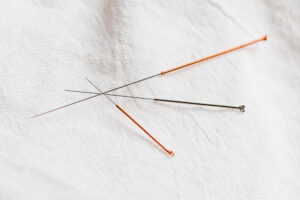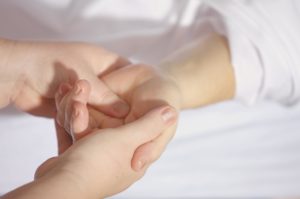THE ART & SCIENCE
Of Traditional Chinese Medicine

Many Westerners are familiar with the general concept of Eastern medicine, but most don’t know how they actually work as they lack a full understanding of what Traditional Chinese Medicine really is. To anyone who has never felt the relief from a precisely placed acupuncture needle, it’s hard to comprehend, but we’re here to help.
Contrary to popular belief in the West, there is a precise structure and nature behind traditional Chinese medicine. These practices have been around for thousands of years, way before Christopher Columbus ever thought about discovering North America (or so they say; that’s another debate within itself). However ancient they may be, they have evolved over time. Eastern medicine implications are a combination of art and science.
For example, two people who find themselves experiencing nausea have the same symptoms. The “art” of traditional Chinese medicine will look at the person as a whole, using their experience to diagnose the proper way to treat the underlying problem rather than just the symptom.
What is Eastern Medicine?
Eastern  medicine is an umbrella term that encompasses all ancient (and modernly-revised) medicinal practices originating in China and its neighboring countries. Traditional Chinese medicine (also called TCM for short or referred to as oriental) is an entire system, structured in a way that targets the body as a whole.
medicine is an umbrella term that encompasses all ancient (and modernly-revised) medicinal practices originating in China and its neighboring countries. Traditional Chinese medicine (also called TCM for short or referred to as oriental) is an entire system, structured in a way that targets the body as a whole.
For example, a Western doctor may look at only one part of your physical body, usually the part where you are expressing discomfort. A TCM practitioner will look at the area of your body that is bothering you, but it doesn’t stop there.
He/she will then assess your mental state and spiritual state. Eastern medicine believes the mind, body, and spirit are all linked together in an intricate system that is powered by a higher, universal energy that flows through all of us. What the body doesn’t reveal, the other two will.
Does Traditional Chinese Medicine Work?
 In a nutshell, yes, it can work. One must be willing to follow their doctor’s recommended healing practices and stay on top of healing sessions, taking herbal supplements, etc. As with Western medicine, it is ultimately up to the patient to heal themselves. Doctors give us the tools and knowledge we need to heal, and we must do the rest- unless your illness requires someone else to provide intensive care.
In a nutshell, yes, it can work. One must be willing to follow their doctor’s recommended healing practices and stay on top of healing sessions, taking herbal supplements, etc. As with Western medicine, it is ultimately up to the patient to heal themselves. Doctors give us the tools and knowledge we need to heal, and we must do the rest- unless your illness requires someone else to provide intensive care.
Eastern medicine works better today than it did in the past, thanks to EBCM. Progressive medical professionals have taken the effectiveness of TCM into their own hands, breaking apart the qualities and procedures of TCM to refine them for greater efficacy.
There is an Art and Science Behind Eastern Medicine Practices

Thanks to evidence-based medicine, the safety and effectiveness of TCM has drastically increased since its inception. Evidence-based Chinese medicine (also known as EBCM) is a relatively new way to approach traditional Chinese medicine- scientifically. It takes the practices and processes of Eastern medicine and sends them through rigorous research, tests, and evaluations in hopes of refining those practices.
Because EBM has transformed the way TCM is experienced, clinicians and medical professionals have increased their use of TCM in health clinics. The development of EBCM has contributed to the modernization and usefulness of TCM, thus affirming its effectiveness to treat illness in a scientific manner.
As far as the art of Eastern medicine is concerned, that goes beyond data-driven results and takes on a metaphysical approach. It is easy to look at the body as separate pieces, each having their own function, but it is incredibly impressive to look at the body as a whole- mind, physicality, and spirit included. Sometimes what is harming the physical self can be traced back to the mind or even the spirit. The art lies in the ability an Eastern medicine practitioner has to look past our physical body into the beyond. It’s almost abstract, but not quite.
There are, however, some issues with using EBCM on Chinese medicine. For one, Chinese Medicine and Western Medicine classify diseases differently. While everyone in the West may get a simple diagnosis of bipolar, in the East the underlying issue is what is categorized, say phlegm harassing the heart. So, to create a study to test you’d have to classify both similarly. In this case, the Western treatment of lithium doesn’t work on all with biopolar, but it is known to reduce phlegm. Additionally, Chinese medicine often finds diseases, like Phlegm, before it gets to the stage of a named western disease. Lastly, not every disease in TCM has a Western equivalence, making it difficult to use Chinese patterns of Western diseases as a criteria. And most importantly, the treatment of Chinese diseases is highly individualized to the patient. A practitioner might use a specific combination of needles, moxibustion, an individualized herbal formula and qigong to treat a patient, so it is hard to standardize.
Will TCM Ever Become Mainstream in the West?
 While we hope Eastern medicine will become mainstream in the West, it might take time for that to happen. Some practices are becoming accepted already, such as yoga, meditation, acupuncture, and drinking herbal remedies. These select health activities have become popular due to younger generations wanting to expand and explore the body and spirit in junction.
While we hope Eastern medicine will become mainstream in the West, it might take time for that to happen. Some practices are becoming accepted already, such as yoga, meditation, acupuncture, and drinking herbal remedies. These select health activities have become popular due to younger generations wanting to expand and explore the body and spirit in junction.
A few years ago the WHO (World Health Organization) actually recognized traditional Chinese medicine as a valid medical practice, proposing that it would be beneficial for everyone’s health if knowledge of TCM was spread. The more we accept new ways of thinking and being, the more oriental medicine will spread. After all, WHO did get something right: knowledge can never hurt because knowledge is power.
Eastern Medicine: Redefining How We View Health
Modern, Westernized medicine tends to be viewed as the only “serious” form of healthcare. But why is that? Yes, there’s no doubt that Western medicine is backed by science and proved to heal, but why are other medicinal practices deemed inferior just become one is towering over all the rest?
Eastern medicine shouldn’t be counted out. In actuality, though TCM has been practiced and refined for centuries, there is still little we know about it. Not because it lacks substance, but because the theory and art of TCM goes beyond what the human mind can comprehend. It is fascinating what little we know about the mind and spirit, which is the basis for oriental medicine.
Redefining how we view health is critical if we ever want to expand our understanding and truly learn how the mind and spirit work- whether one believes the mind affects the body or not, science can prove the link between mental health and physical illness.
Newer
Why You Can’t Sleep And How Traditional Chinese Medicine Can Help
Older
Taking on Cold? A Bit on Fire? Understanding Eastern Medicine's Hot VS. Cold
Comments (0)
Leave a reply
You must be logged in to post a comment.




